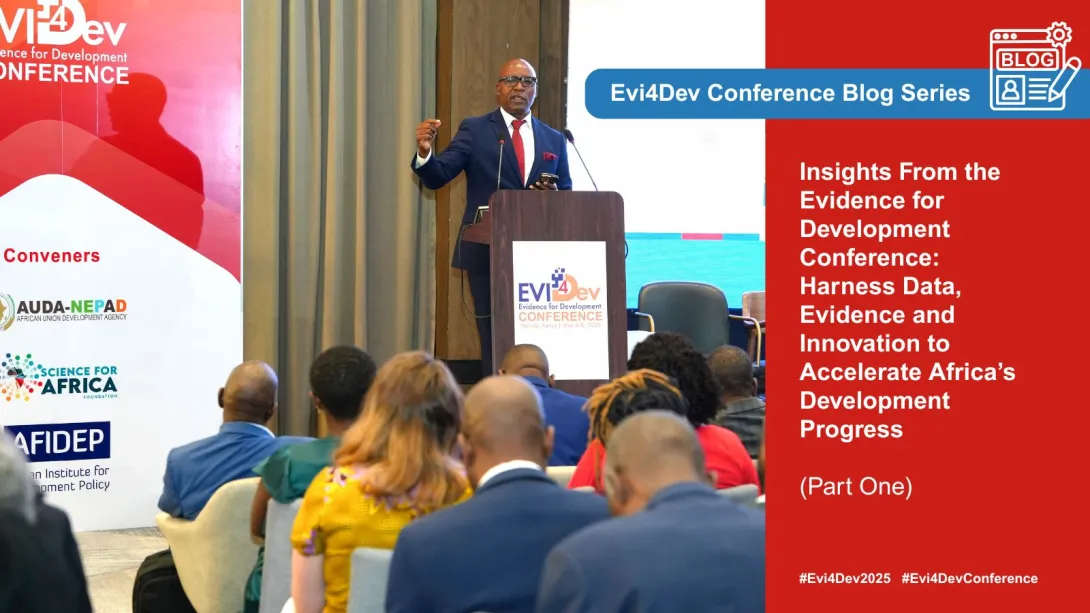
By Derick Ngaira
The inaugural Evidence for Development (Evi4Dev) Conference, held on May 6–8, 2025, in Nairobi, Kenya, brought together over 400 delegates from 30 countries, including policymakers, researchers, youth innovators, and development partners.
With the theme Optimising the Role of Data, Evidence, and Innovations in Africa’s Efforts to Create Wealth, Empower Citizens, and Foster Responsive Governance, the conference offered a platform to align science, technology, innovation (STI) and evidence-informed policymaking (EIP) with the African Union’s Agenda 2063 and the Sustainable Development Goals (SDGs). It was co-convened by the African Union Development Agency (AUDA-NEPAD), African Institute for Development Policy (AFIDEP), and Science for Africa Foundation (SFA Foundation), with support from various partners.
This blog series unpacks key insights from the conference across seven thematic areas. This first part explores how Africa can harness data, evidence, and innovation to accelerate inclusive development.
Part 1: Prioritising data, evidence, and innovation to spur growth in Africa
Africa stands at a turning point in its development journey. While the continent continues to make strides in areas such as education, health, and infrastructure, the pace and quality of progress remain uneven. One major reason is that decision-making is often not grounded in timely, accurate, and relevant data. At the Evi4Dev conference, experts emphasised that if Africa is to realise its development ambitions, it must prioritise data, evidence, and innovation—not as buzzwords, but as central pillars of policy and action.
The quality of decisions taken by governments, development partners, and private sector actors is only as good as the information that informs them. Yet, across the continent, there are still gaps in evidence-informed planning. Too often, decisions are made based on assumptions, outdated data, or political convenience. To move forward, Africa should deepen its investment in high-quality research and innovations that are not only robust, but also aligned with local priorities.
Researchers and civil society organisations have a critical role to play in amplifying the value of evidence in public discourse. Their work must go beyond academic circles and reach the communities, leaders, and institutions that shape development outcomes. Importantly, collaboration is key. Partnerships among researchers, policymakers, private sector actors, and community groups can ensure that evidence reflects real-world needs and is more likely to be adopted in practice.
But evidence generation does not come cheaply. For Africa to lead in innovation and knowledge production, governments and development partners must commit more resources. That means investing not only in research institutions but also in systems that support innovation, from intellectual property protection to commercialisation pathways. Local innovations, once developed, must be protected and scaled up across borders. This requires more than funding; it demands smart policies that incentivise knowledge exchange and support an ecosystem where African solutions can thrive.
Equally important is shifting the mindset around how evidence is used. Data must not sit in reports or dashboards; it should inform planning, budgeting, and implementation at every level. This calls for a culture change across institutions. Leaders need to model and reward evidence use. Researchers need to learn to communicate their findings in ways that resonate with policymakers and citizens alike. And communities should be empowered to ask for, and expect, evidence-backed interventions.
One promising approach is embedding community context in research and innovation efforts. When communities see their needs reflected in evidence, they are more likely to support and sustain interventions. Likewise, involving policymakers from the start can improve uptake and reduce the gap between research and action.
Africa has the talent, creativity, and will to drive its own development. But good intentions are not enough. Without better data, stronger evidence, and a deliberate focus on innovation, progress will remain out of reach. Now is the time to act, decisively and collaboratively, to make evidence the engine of Africa’s transformation.
Part 2 of the blog series will focus on how STI should power Africa’s development vision.

